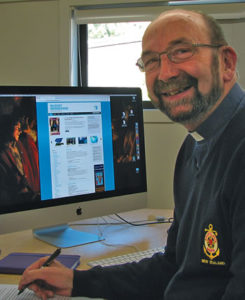The Annunciation and Us
 In his General Audience of 23 October 2013, Pope Francis said,
In his General Audience of 23 October 2013, Pope Francis said,
At the Annunciation, the Messenger of God calls Mary ‘full of grace’ and reveals his plan to her. Mary answers ‘yes’, and from that moment Mary's faith receives new light: it is concentrated on Jesus, the Son of God, who took flesh from her and in whom all the promises of salvation history are fulfilled. Mary's faith is the fulfilment of Israel's faith. The whole journey, the whole path of that people awaiting redemption is contained in her, and it is in this sense that she is the model of the Church's faith, which has Christ, the Incarnation of God's infinite love, as its centre.
For his mother, God chose an unknown teenage girl from a little-known town in the backblocks. It wasn’t at all clear to Mary what God had in mind, so she asked a question, and once she had some idea of what God wanted, she responded without hesitation. Hers was the “obedience of faith” of which the Letter to the Romans (1:5) speaks.
God freely chose Mary to be the mother of his beloved Son, and God’s choice of Mary made her “full of grace”. Mary did nothing to deserve such a privilege, because God’s choosing her was pure gift, springing from God’s infinite big-heartedness.
God chose Mary, and God’s choice makes her worthy because God’s love has made her full of grace. The Magnificat reflects the true situation when Mary says,
My soul glorifies the Lord; my spirit rejoices in God, my Saviour.
He looks on his servant in her nothingness;
henceforth all ages will call me blessed.
The Almighty works marvels for me, holy his name.
With her ‘yes’ to God’s invitation to be Christ’s mother, Mary “brought God to a level that the world can understand. Mary gave flesh to the Word” (Craig Larkin, A Certain Way, p. 58).
God chose Mary for a particular task, a mission -- to give Jesus to the whole world and all its people. In Lumen Gentium # 54, the Church teaches that Mary “occupies a place in the Church which is the highest after Christ and yet very close to us”.
Mary is very close to us because, just as Mary was chosen by God for a particular mission, to give Christ to the world, so are we. God has a role for each of us, to give flesh to the Word through the goodness of our lives, to enable Christ to come alive for people because his goodness and light shine in us. Pope St Paul VI wrote that “Modern people listen more willingly to witnesses than to teachers, and if they do listen to teachers, it is because they are witnesses” (Evangelii Nuntiandi, 1975, # 41).
“… it is only in human terms, in human example and human words that Christ will ever become actual to people in any age, … [Mary’s] spirit is essentially a prolonging, a keeping in being, of the Incarnation. She alone, of all humankind, gave Christ to the world” (Fr Kevin Maher SM, Flesh to the Word, p. 11).
The difference between Mary and us is that Mary responded fully to what God wanted of her. In contrast, we may hold back in responding to what God wants of us. St Paul wrote that God “chose us, chose us in Christ to be holy and spotless and to live through love in his presence” (Ephesians 1:4). God has chosen each and every one of us to give ourselves utterly in the service of God’s plan, and so become the person God chose us to be.
“Rejoice, so highly favoured! The Lord is with you”. The words said to Mary by the angel Gabriel are addressed not only to her but to us as well. We are highly favoured, and the Lord is with us! “Rejoice, highly favoured ones, for I have called you to be holy! Rejoice, all of you!”
 Entries(RSS)
Entries(RSS)